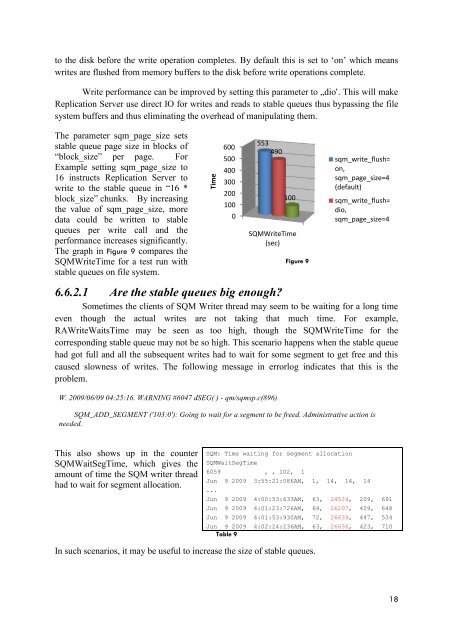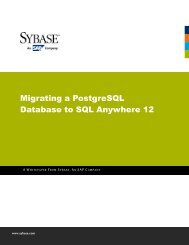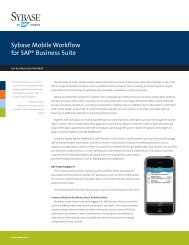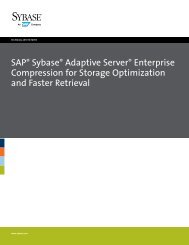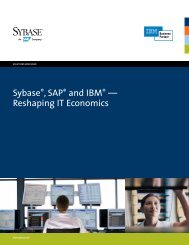Replication Server 15.5 Performance and Tuning Tips - Sybase
Replication Server 15.5 Performance and Tuning Tips - Sybase
Replication Server 15.5 Performance and Tuning Tips - Sybase
Create successful ePaper yourself
Turn your PDF publications into a flip-book with our unique Google optimized e-Paper software.
to the disk before the write operation completes. By default this is set to „on‟ which means<br />
writes are flushed from memory buffers to the disk before write operations complete.<br />
Write performance can be improved by setting this parameter to „dio‟. This will make<br />
<strong>Replication</strong> <strong>Server</strong> use direct IO for writes <strong>and</strong> reads to stable queues thus bypassing the file<br />
system buffers <strong>and</strong> thus eliminating the overhead of manipulating them.<br />
The parameter sqm_page_size sets<br />
stable queue page size in blocks of<br />
“block_size” per page. For<br />
Example setting sqm_page_size to<br />
16 instructs <strong>Replication</strong> <strong>Server</strong> to<br />
write to the stable queue in “16 *<br />
block_size” chunks. By increasing<br />
the value of sqm_page_size, more<br />
data could be written to stable<br />
queues per write call <strong>and</strong> the<br />
performance increases significantly.<br />
The graph in Figure 9 compares the<br />
SQMWriteTime for a test run with<br />
stable queues on file system.<br />
Time<br />
600<br />
500<br />
400<br />
300<br />
200<br />
100<br />
0<br />
553<br />
490<br />
100<br />
SQMWriteTime<br />
(sec)<br />
Figure 9<br />
sqm_write_flush=<br />
on,<br />
sqm_page_size=4<br />
(default)<br />
sqm_write_flush=<br />
dio,<br />
sqm_page_size=4<br />
6.6.2.1 Are the stable queues big enough?<br />
Sometimes the clients of SQM Writer thread may seem to be waiting for a long time<br />
even though the actual writes are not taking that much time. For example,<br />
RAWriteWaitsTime may be seen as too high, though the SQMWriteTime for the<br />
corresponding stable queue may not be so high. This scenario happens when the stable queue<br />
had got full <strong>and</strong> all the subsequent writes had to wait for some segment to get free <strong>and</strong> this<br />
caused slowness of writes. The following message in errorlog indicates that this is the<br />
problem.<br />
W. 2009/06/09 04:25:16. WARNING #6047 dSEG( ) - qm/sqmsp.c(896)<br />
SQM_ADD_SEGMENT ('103:0'): Going to wait for a segment to be freed. Administrative action is<br />
needed.<br />
This also shows up in the counter<br />
SQMWaitSegTime, which gives the<br />
amount of time the SQM writer thread<br />
had to wait for segment allocation.<br />
SQM: Time waiting for segment allocation<br />
SQMWaitSegTime<br />
6059 , , 102, 1<br />
Jun 9 2009 3:55:21:086AM, 1, 14, 14, 14<br />
...<br />
Jun 9 2009 4:00:53:633AM, 63, 24524, 209, 691<br />
Jun 9 2009 4:01:23:726AM, 64, 26207, 409, 648<br />
Jun 9 2009 4:01:53:930AM, 72, 26639, 447, 534<br />
Jun 9 2009 4:02:24:236AM, 63, 26636, 423, 710<br />
Table 9<br />
In such scenarios, it may be useful to increase the size of stable queues.<br />
18


